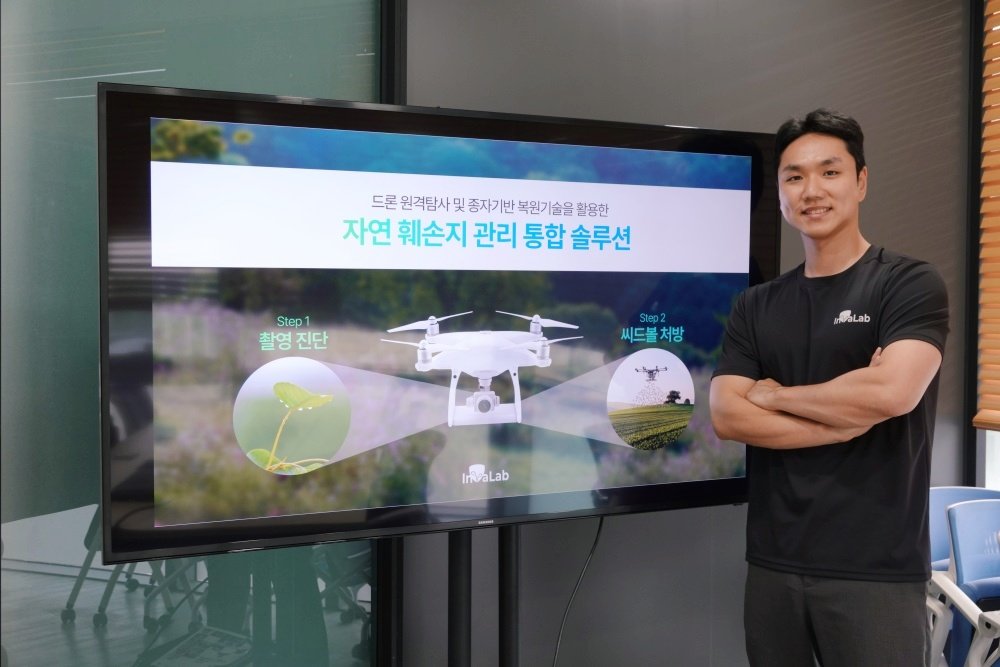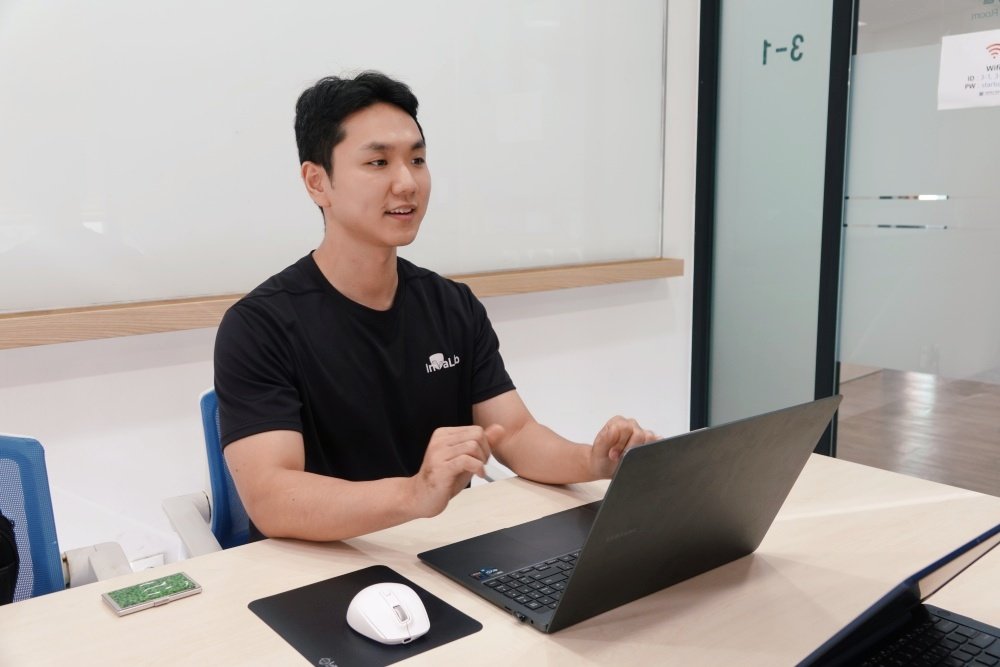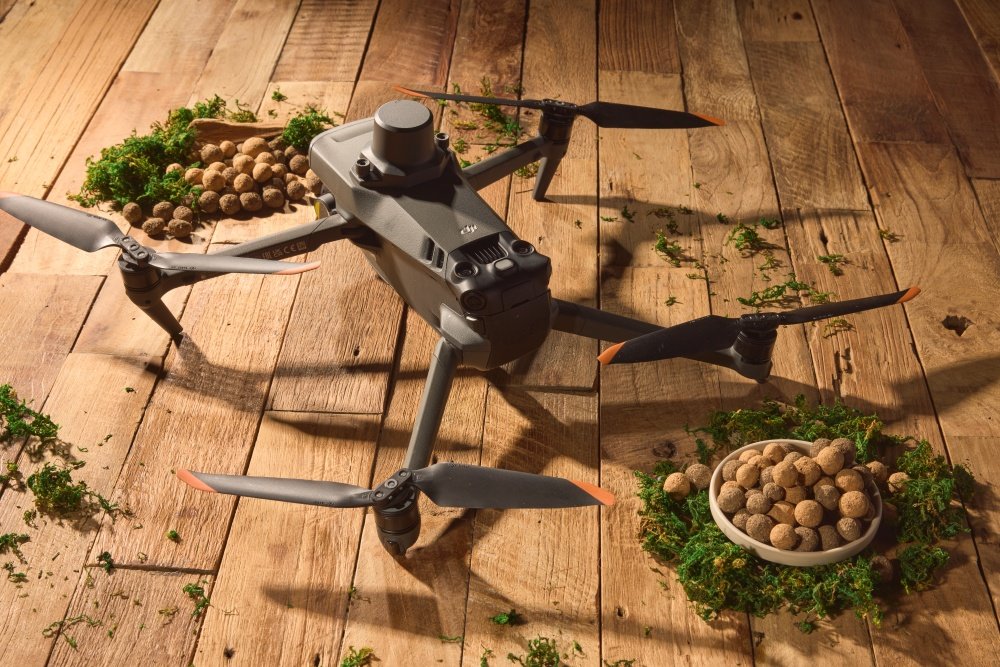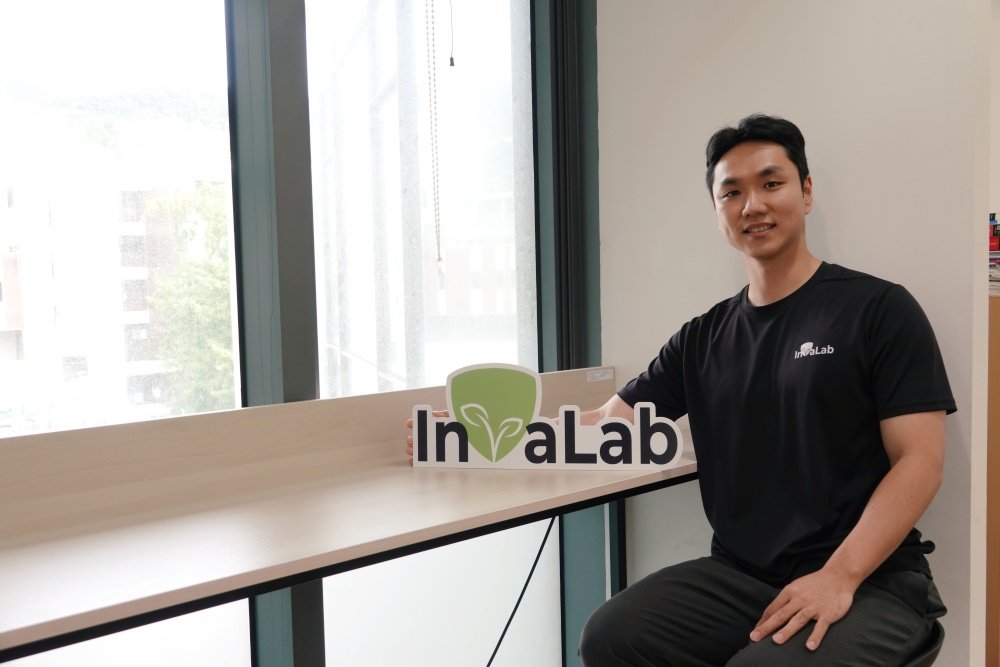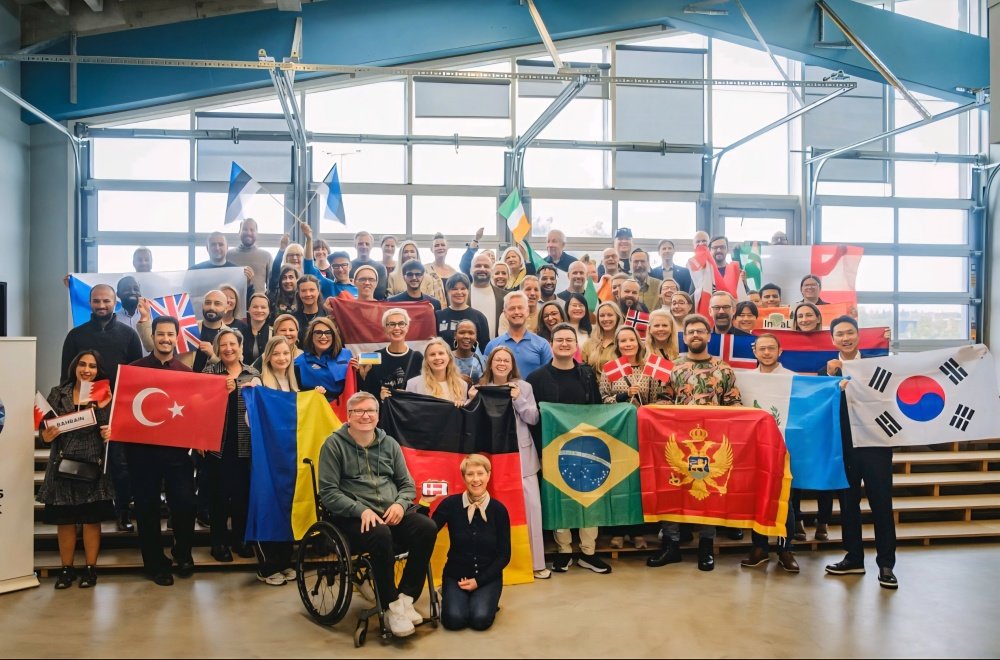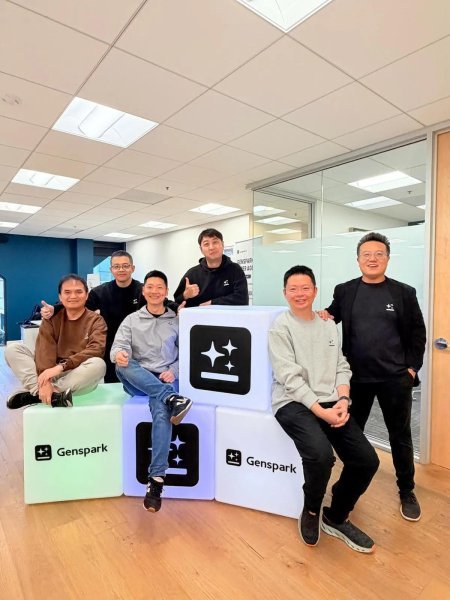
Tech / Environmental Tech
Invelab's Challenge: AI, Drones for Ecosystem Restoration
Dong-A Ilbo |
Updated 2025.10.28
[The University of Seoul has been leading youth entrepreneurship and regional innovation since 2022, starting with the 'Seoul Impact' project, under the vision of 'The Most Seoul-like Influence, the Most Global Value.' It particularly focuses on supporting startups in AI-based urban innovation and social impact sectors, creating a sustainable startup ecosystem where technology and social value harmonize. It was selected as an excellent case in the regional revitalization field of the Seoul Campus Town project and received an A+ grade in the 2024 Seoul Campus Town performance evaluation. IT Donga introduces the growth stories and innovative achievements of AI startups nurtured by the University of Seoul.]
“We will create a sustainable future where nature and humans coexist based on scientific evidence.”
The damage to ecosystems due to abnormal climate is severe. Invasive plants such as Ambrosia artemisiifolia, Humulus japonicus, and Solidago altissima are spreading across the country, threatening native species. These plants not only disrupt local ecosystems with their rapid and strong reproductive power but also negatively impact human health by causing crop damage and allergies. The range of affected areas is also expanding annually.
However, effectively managing invasive plants and restoring damaged ecosystems is not easy. It requires extensive field surveys and specialized personnel, and continuous monitoring is essential even after removal. Nature tech startup InvaLab Co., Ltd. is stepping forward to solve this problem with AI, drones, and IoT technology. CEO Shin Won-hyup discussed the direction and goals of the business.
Unexpected Decision to Start a Business with Expertise in Biodiversity
Founded in 2023, InvaLab is a company developing integrated solutions for controlling invasive plants. Inspired by the word 'Invasion,' CEO Shin Won-hyup named the company with the dual meaning of 'preventing the invasion of invasive plants and penetrating invisible areas with remote sensing technology to quantify biodiversity.' Biodiversity refers to the total diversity of species, ecosystems, and genes on Earth and is crucial as it forms the basis for maintaining ecosystem functions.
InvaLab was established on September 7, designated by the United Nations (UN) as the 'International Day of Clean Air for Blue Skies.' This day has been commemorated since 2020 to raise awareness of environmental pollution and promote pollution reduction and clean air. It is significant as the first UN official commemorative day proposed by the Korean government and a national holiday.
CEO Shin Won-hyup did not initially intend to start a business. In 2018, while about to graduate with a master's degree in plant ecology from Seoul National University, he had the opportunity to intern at the United Nations Development Programme (UNDP) regional office in Bangkok, Thailand, for about six months. During this time, he felt frustrated by the slow pace of solving social and climate issues despite the availability of technology due to organizational governance problems. He also faced realistic concerns that frequent personnel changes might prevent him from continuing the research he pursued. He later obtained a Ph.D. in landscape architecture from Seoul National University in 2024, further developing his expertise in the natural environment and ecosystem field.
CEO Shin, who consistently researched plant ecology-related fields, said, “Plant ecology is a labor-intensive field operated by experts, but the workforce is continuously decreasing due to harsh fieldwork and low treatment. There was a need to technologically overcome the structure where labor is doubled from data acquisition to analysis. To solve this problem technologically and apply solutions quickly, I naturally founded InvaLab.”
Offering Integrated Solutions from Precise Diagnosis to Customized Execution
InvaLab provides integrated solutions that add core technology based on scientific evidence to natural environment ecosystem restoration. This core technology consists of two pillars: precise diagnosis (monitoring) and customized execution (restoration).
First, precise diagnosis utilizes remote sensing techniques that integrate and analyze multispectral drone and general high-resolution drone images. Currently, the accuracy of biological detection is secured up to 95%. It quantifies organisms in areas invisible to the naked eye. Based on this diagnostic result, InvaLab produces and sows its self-developed Seed Ball, implementing customized execution. Determining the appropriate function and quantity of Seed Balls needed for restoration is also a core technology.
CEO Shin emphasized, “In the medical field, there are many imaging diagnostic technologies like CT (Computed Tomography) or X-ray equipment, but accurately diagnosing the captured images and prescribing appropriately is more important. InvaLab is the same. We have proprietary technology to analyze drone-captured images and ecological data, make decisions, and determine the function and quantity of necessary Seed Balls.”
The solutions offered by InvaLab include ▲NATURE Blitz ▲NATURE X, among others. NATURE Blitz is a customized Seed Ball product for damaged area recovery and restoration. It is custom-made by selecting seeds reflecting the functional competition principle of native species and combining them with suitable soil and nutrients. It boasts the highest level of alternative plant technology in Korea, with two related patents and nine SCI-level papers. It solves the fragmentation problem of existing management methods and enables work even in restricted areas by reducing personnel accidents through drone operation.
Another feature of InvaLab is operating monitoring and seeding drones separately. For monitoring, small drones equipped with LiDAR or multispectral sensors are used, while large agricultural drones over 25kg are utilized for seeding. The impeller module used for seeding is a technology owned by InvaLab.
Lastly, NATURE X is a platform currently being developed in the form of Software as a Service (SaaS) that uses spatial quantitative data generated through remote sensing. It visualizes accumulated spatial quantitative data and can be used for corporate ESG performance evaluation and non-financial risk management. By applying digital twin technology, it also supports long-term spatial management decision-making. CEO Shin explained, “Instead of simply planting trees in damaged areas, we quantify which organisms additionally enter and how much carbon credits increase, creating a structure that returns more achievements or value to social value, which is InvaLab's differentiator.”
Challenges in Persuading the Necessary but Unfamiliar Field of Ecological Restoration
InvaLab started with CEO Shin Won-hyup and three master's and doctoral-level researchers from Seoul National University's Graduate School of Environmental Studies and Graduate School of Engineering, and has grown to a team of seven. During this process, it stood out by winning the top prize at the 'Innovation Camp Startup Competition' in 2023 and the grand prize at the 'CBC KOREA Startup Competition' in 2024. In 2024, it was selected as an early startup company by the Ministry of SMEs and Startups and the Korea Startup Promotion Agency, and also selected for the Startup Growth Technology Development Project and TIPS support program.
In the process of developing such proprietary technology, InvaLab experienced various trial and error. There was the burden of focusing on securing talent, as well as difficulties in persuading clients and investors about the unfamiliar field of ecological restoration or biodiversity.
CEO Shin stated, “Ecological restoration is not a market where competitors are actively operating, so it costs more to find demand and persuade clients. It is still a challenge for InvaLab to appeal to the point of continuously quantifying an opaque and difficult-to-quantify market and solving something meaningful to society technologically.”
Nevertheless, InvaLab is overcoming the challenges of pioneering the ecological restoration market by actively participating in open innovation and PoC (Proof of Concept) programs with its proprietary technology and government and private company collaborations. It is also building a network by collaborating with various companies. Recently, it has been focusing on customer-friendly branding by hiring a designer. CEO Shin said, “If the expression biodiversity feels difficult, InvaLab's mission will also feel difficult. It was important to give a customer-friendly impression.”
Aiming for Overseas Expansion Recognized at Global Startup Competition
InvaLab participated as the Korean representative in the global startup competition 'Creative Business Cup 2025' held in Copenhagen, Denmark, this year, winning second place. InvaLab's nature-based ecological restoration solution was recognized as a business model on the international stage, signaling a green light for overseas expansion.
With this opportunity, InvaLab's goal has become clearer: to grow into a global biodiversity management company. It particularly aims to provide 'resilient' restoration plans to prevent recurrence after large-scale disasters in regions like California, USA, and British Columbia, Canada, where wildfires are frequent. CEO Shin explained, “It is not just about removing trees but planning an environment that can have resilience by arranging firebreaks or less flammable species and considering biodiversity.”
Although there are overseas competitors like Flash Forest in Canada and Dendra in Australia, they are also startups around five years old and still in the validation stage. CEO Shin emphasized, “InvaLab thinks it sells performance, not products or services. It has a differentiator in sharing the company's vision with customers like Patagonia. In that sense, InvaLab dreams of being Korea's Patagonia.”
Reviving damaged nature and creating a sustainable future is now a necessity, not a choice. InvaLab is growing with the dream of leading a sustainable future where nature and humans can coexist.
Meanwhile, InvaLab was selected as a resident company of the AI Impact Lab at the University of Seoul's Campus Town this year. CEO Shin said, “After being selected as a resident company of the AI Impact Lab, we received commercialization funds. It helped in advancing InvaLab's products and solutions. There was also an opportunity to apply for and participate in seminars needed for InvaLab. In addition, we are receiving various support such as mentoring and consulting from the University of Seoul's Campus Town.”
IT Donga Reporter Park Gwi-im (luckyim@itdonga.com)
“We will create a sustainable future where nature and humans coexist based on scientific evidence.”
Shin Won-hyup, CEO of InvaLab / Source=IT Donga
The damage to ecosystems due to abnormal climate is severe. Invasive plants such as Ambrosia artemisiifolia, Humulus japonicus, and Solidago altissima are spreading across the country, threatening native species. These plants not only disrupt local ecosystems with their rapid and strong reproductive power but also negatively impact human health by causing crop damage and allergies. The range of affected areas is also expanding annually.
However, effectively managing invasive plants and restoring damaged ecosystems is not easy. It requires extensive field surveys and specialized personnel, and continuous monitoring is essential even after removal. Nature tech startup InvaLab Co., Ltd. is stepping forward to solve this problem with AI, drones, and IoT technology. CEO Shin Won-hyup discussed the direction and goals of the business.
Unexpected Decision to Start a Business with Expertise in Biodiversity
Founded in 2023, InvaLab is a company developing integrated solutions for controlling invasive plants. Inspired by the word 'Invasion,' CEO Shin Won-hyup named the company with the dual meaning of 'preventing the invasion of invasive plants and penetrating invisible areas with remote sensing technology to quantify biodiversity.' Biodiversity refers to the total diversity of species, ecosystems, and genes on Earth and is crucial as it forms the basis for maintaining ecosystem functions.
CEO Shin Won-hyup, who majored in plant ecology, founded InvaLab to solve problems in the field through technology / Source=IT Donga
InvaLab was established on September 7, designated by the United Nations (UN) as the 'International Day of Clean Air for Blue Skies.' This day has been commemorated since 2020 to raise awareness of environmental pollution and promote pollution reduction and clean air. It is significant as the first UN official commemorative day proposed by the Korean government and a national holiday.
CEO Shin Won-hyup did not initially intend to start a business. In 2018, while about to graduate with a master's degree in plant ecology from Seoul National University, he had the opportunity to intern at the United Nations Development Programme (UNDP) regional office in Bangkok, Thailand, for about six months. During this time, he felt frustrated by the slow pace of solving social and climate issues despite the availability of technology due to organizational governance problems. He also faced realistic concerns that frequent personnel changes might prevent him from continuing the research he pursued. He later obtained a Ph.D. in landscape architecture from Seoul National University in 2024, further developing his expertise in the natural environment and ecosystem field.
CEO Shin, who consistently researched plant ecology-related fields, said, “Plant ecology is a labor-intensive field operated by experts, but the workforce is continuously decreasing due to harsh fieldwork and low treatment. There was a need to technologically overcome the structure where labor is doubled from data acquisition to analysis. To solve this problem technologically and apply solutions quickly, I naturally founded InvaLab.”
Offering Integrated Solutions from Precise Diagnosis to Customized Execution
InvaLab provides integrated solutions that add core technology based on scientific evidence to natural environment ecosystem restoration. This core technology consists of two pillars: precise diagnosis (monitoring) and customized execution (restoration).
First, precise diagnosis utilizes remote sensing techniques that integrate and analyze multispectral drone and general high-resolution drone images. Currently, the accuracy of biological detection is secured up to 95%. It quantifies organisms in areas invisible to the naked eye. Based on this diagnostic result, InvaLab produces and sows its self-developed Seed Ball, implementing customized execution. Determining the appropriate function and quantity of Seed Balls needed for restoration is also a core technology.
CEO Shin emphasized, “In the medical field, there are many imaging diagnostic technologies like CT (Computed Tomography) or X-ray equipment, but accurately diagnosing the captured images and prescribing appropriately is more important. InvaLab is the same. We have proprietary technology to analyze drone-captured images and ecological data, make decisions, and determine the function and quantity of necessary Seed Balls.”
NATURE Blitz and NATURE X are representative solutions offered by InvaLab / Source=InvaLab
The solutions offered by InvaLab include ▲NATURE Blitz ▲NATURE X, among others. NATURE Blitz is a customized Seed Ball product for damaged area recovery and restoration. It is custom-made by selecting seeds reflecting the functional competition principle of native species and combining them with suitable soil and nutrients. It boasts the highest level of alternative plant technology in Korea, with two related patents and nine SCI-level papers. It solves the fragmentation problem of existing management methods and enables work even in restricted areas by reducing personnel accidents through drone operation.
Another feature of InvaLab is operating monitoring and seeding drones separately. For monitoring, small drones equipped with LiDAR or multispectral sensors are used, while large agricultural drones over 25kg are utilized for seeding. The impeller module used for seeding is a technology owned by InvaLab.
Lastly, NATURE X is a platform currently being developed in the form of Software as a Service (SaaS) that uses spatial quantitative data generated through remote sensing. It visualizes accumulated spatial quantitative data and can be used for corporate ESG performance evaluation and non-financial risk management. By applying digital twin technology, it also supports long-term spatial management decision-making. CEO Shin explained, “Instead of simply planting trees in damaged areas, we quantify which organisms additionally enter and how much carbon credits increase, creating a structure that returns more achievements or value to social value, which is InvaLab's differentiator.”
Challenges in Persuading the Necessary but Unfamiliar Field of Ecological Restoration
InvaLab started with CEO Shin Won-hyup and three master's and doctoral-level researchers from Seoul National University's Graduate School of Environmental Studies and Graduate School of Engineering, and has grown to a team of seven. During this process, it stood out by winning the top prize at the 'Innovation Camp Startup Competition' in 2023 and the grand prize at the 'CBC KOREA Startup Competition' in 2024. In 2024, it was selected as an early startup company by the Ministry of SMEs and Startups and the Korea Startup Promotion Agency, and also selected for the Startup Growth Technology Development Project and TIPS support program.
InvaLab is overcoming the challenges of pioneering the ecological restoration market by actively participating in open innovation and PoC programs with its proprietary technology and government and private company collaborations / Source=IT Donga
In the process of developing such proprietary technology, InvaLab experienced various trial and error. There was the burden of focusing on securing talent, as well as difficulties in persuading clients and investors about the unfamiliar field of ecological restoration or biodiversity.
CEO Shin stated, “Ecological restoration is not a market where competitors are actively operating, so it costs more to find demand and persuade clients. It is still a challenge for InvaLab to appeal to the point of continuously quantifying an opaque and difficult-to-quantify market and solving something meaningful to society technologically.”
Nevertheless, InvaLab is overcoming the challenges of pioneering the ecological restoration market by actively participating in open innovation and PoC (Proof of Concept) programs with its proprietary technology and government and private company collaborations. It is also building a network by collaborating with various companies. Recently, it has been focusing on customer-friendly branding by hiring a designer. CEO Shin said, “If the expression biodiversity feels difficult, InvaLab's mission will also feel difficult. It was important to give a customer-friendly impression.”
Aiming for Overseas Expansion Recognized at Global Startup Competition
InvaLab participated as the Korean representative in the global startup competition 'Creative Business Cup 2025' held in Copenhagen, Denmark, this year, winning second place. InvaLab's nature-based ecological restoration solution was recognized as a business model on the international stage, signaling a green light for overseas expansion.
InvaLab participated as the Korean representative in the global startup competition 'Creative Business Cup 2025,' winning second place / Source=InvaLab
With this opportunity, InvaLab's goal has become clearer: to grow into a global biodiversity management company. It particularly aims to provide 'resilient' restoration plans to prevent recurrence after large-scale disasters in regions like California, USA, and British Columbia, Canada, where wildfires are frequent. CEO Shin explained, “It is not just about removing trees but planning an environment that can have resilience by arranging firebreaks or less flammable species and considering biodiversity.”
Although there are overseas competitors like Flash Forest in Canada and Dendra in Australia, they are also startups around five years old and still in the validation stage. CEO Shin emphasized, “InvaLab thinks it sells performance, not products or services. It has a differentiator in sharing the company's vision with customers like Patagonia. In that sense, InvaLab dreams of being Korea's Patagonia.”
Reviving damaged nature and creating a sustainable future is now a necessity, not a choice. InvaLab is growing with the dream of leading a sustainable future where nature and humans can coexist.
Meanwhile, InvaLab was selected as a resident company of the AI Impact Lab at the University of Seoul's Campus Town this year. CEO Shin said, “After being selected as a resident company of the AI Impact Lab, we received commercialization funds. It helped in advancing InvaLab's products and solutions. There was also an opportunity to apply for and participate in seminars needed for InvaLab. In addition, we are receiving various support such as mentoring and consulting from the University of Seoul's Campus Town.”
IT Donga Reporter Park Gwi-im (luckyim@itdonga.com)
AI-translated with ChatGPT. Provided as is; original Korean text prevails.
ⓒ dongA.com. All rights reserved. Reproduction, redistribution, or use for AI training prohibited.
Popular News







